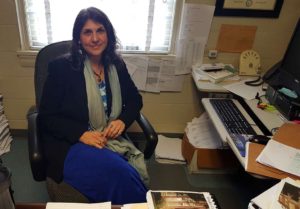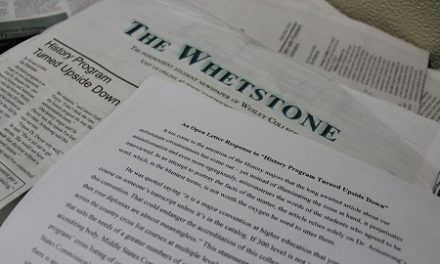By Adriane Fraser and Kristen Griffith, The Whetstone
Freshman Monshea Murray said she knew freshmen from fall semester who left Wesley for a lot of reasons.
“Some people say this college wasn’t for them,†she said. “Some people said it was too small and they wanted to go to a bigger university, some people said school wasn’t for them; this was like a test run for them.â€
“They’re there when I get to class, they’re there when I get out of class, they’re there at night, they’re there in the morning. I just wonder when do you have the time to focus on your academics.â€
–Monshea Murray.
Wesley’s administration and faculty say they are attempting to increase student retention after a significant number of freshmen did not return from 2009 to 2010.
After student retention decreased by 9.8 percent in 2010, the administration set up committees to research why students left and how to get them to stay.
In 2009, nearly half of all fulltime first-time freshmen stayed for their second year. But in 2010, only about 40 percent were retained.
Murray said she suspects some freshmen aren’t serious about school.
“It kind of makes me wonder because they’re in the square [North Plaza] for hours,†she said.
She said she can hear them from her room in Gooding Hall.
“When do you have time to do your homework or go to class,†she said. “They’re there when I got to class, they’re there when I get out of class, they’re there at night, they’re there in the morning. I just wonder when do you have the time to focus on your academics.â€
After the 2011 freshmen entered, interim Vice President of Academic Affairs Jeffrey Gibson said a consulting group suggested measures to take to elevate retention.
“From the way in which we structure the college – physically in some ways – to the support systems program we created in the ARC (Academic Resource Center),†he said.
Tutor Nicole Evanko said she witnessed the ARC’s 5-card program to encourage students to focus on their academics.
“You get an index card or business card and every time you come the tutor stamps it saying that you’ve been here,†she said. “Once your card reaches five you put it in a bin and there’s a raffle every month,†she said.
Evanko said she thinks students leave for financial reasons.
“I know a lot of my friends don’t come back because they can’t afford it, and they owe Wesley a lot of money because of that,†she said. “I don’t think it has to do with academic reasons, but more tuition-based.â€
Gibson said in the past, the administration didn’t check to see if each freshmen was a good match for Wesley.
Retention tracking statistics
“What we’ve been trying to do over the years is really find those students to recruit who will really fit in well at Wesley College, and also persist and be successful in their coursework,†he said.
He said retention has been at its best these last two years.
“We can see that in our classrooms because we have many more students in upper level classes than we have seen in years past,†he said.
According to college’s own statistics, more than half of 2012 and 2013 freshmen stayed for their second year, a 12.5 percent increase from 2011.
Gibson said he predicts a slight increase for the 2014 and 2015 freshmen.
“Many of the systems that we put into place that helped us improve the retention 11 percentage points,†he said. “They’re still in place including some other initiatives as well. I hope that would mean a steady increase.â€
Wanda Anderson, dean of students, also said retention rates continue to improve.
“Each year more students are making the decision to stay at Wesley which is a wonderful thing,†she said.
She said Wesley and the students themselves aren’t the problems when it comes to leaving Wesley.
“A college experience must be a good fit academically, socially, financially, etc., for a student to stay and graduate from the college,†Anderson said.
She said a number of reasons could lead to students leaving.
“The expectations of what college would be like is different from the student’s reality when they come to campus, students inability to adjust to their new environment, financial obstacles, academic challenges and/or personal issues,†Anderson said.
Chief Financial Officer Dr. Christine Gibson said some students leave Wesley for financial reasons, but many are personal.
“Each student has a different situation and we consider a wide variety of factors when helping students with financial assistance,†she said. “We administer Federal, State and private aid appropriately as it applies to each student.â€
CFO Gibson said they do what they can with the resources available to help students and their families financially.
“But there is a cost to attend a private college or any college or university and each family has to work out their solutions based on what is right for them,†she said.
She said some advice she offers students is to fill out FAFSA and other required documents early.

Dr. Angela D’Antonio
“For ensuring you receive aid once it is awarded and if you are selected by verification by the Federal Government – respond quickly with tax documents and other items as required,†she said. “The pro-active student receives everything that is available in the form of financial aid and those who procrastinate can hurt their opportunity for assistance by mission deadlines.â€
“We had a great enrollment, but so many students left after the first semester.â€
–Dr. Angela D’Antonio
Dr. Angela D’Antonio said student retention has been bad.
“It’s been poor since I’ve been here,†she said. “We’re not really sure what the reason is for it when a lot of factors lead to it.â€
D’Antonio said freshmen who came in 2008, 2009 and 2010 were part of big classes.
“We had a great enrollment, but so many students left after the first semester,†she said.
D’Antonio, a psychology professor, leads the Academic Affairs Committee.
“One of the duties or charges is to participate in decision making regarding a whole bunch of stuff,†she said. “One of the things is retention.â€
The committee is responsible for introducing new policies to the faculty so they can vote on its approval.
Gibson said one of the things done to improve retention was adding additional services and attention to the Academic Support Center. They also moved the financial aid office from State Street to the third floor.
“To make it easier for students to work with the registrar office, the business office and the financial aid office,†he said. “That ease of access contributes a bit.â€
He also said the school implemented Lantern, which helps faculty and staff communicate with each other about students.
“If we hear a student is not fitting in or might not return, we can put a report into Lantern and have people reach out to them,†Gibson said.

Nicole Evanko
D’Antonio also said Lantern was a successful component for improving retention.
“If I had a student who missed a test or class, I would report on [Lantern],†she said. “If someone is struggling and no one knows about it, we can investigate.â€
Murray said the size of the campus keeps her at Wesley.
“It’s easier to get closer with your professors and they actually care about you,†she said.
Evanko said she made Wesley a home since her hometown is five hours away.
“Here I made a lot of friends and I just really enjoy the environment and being like a family here,†she said.




